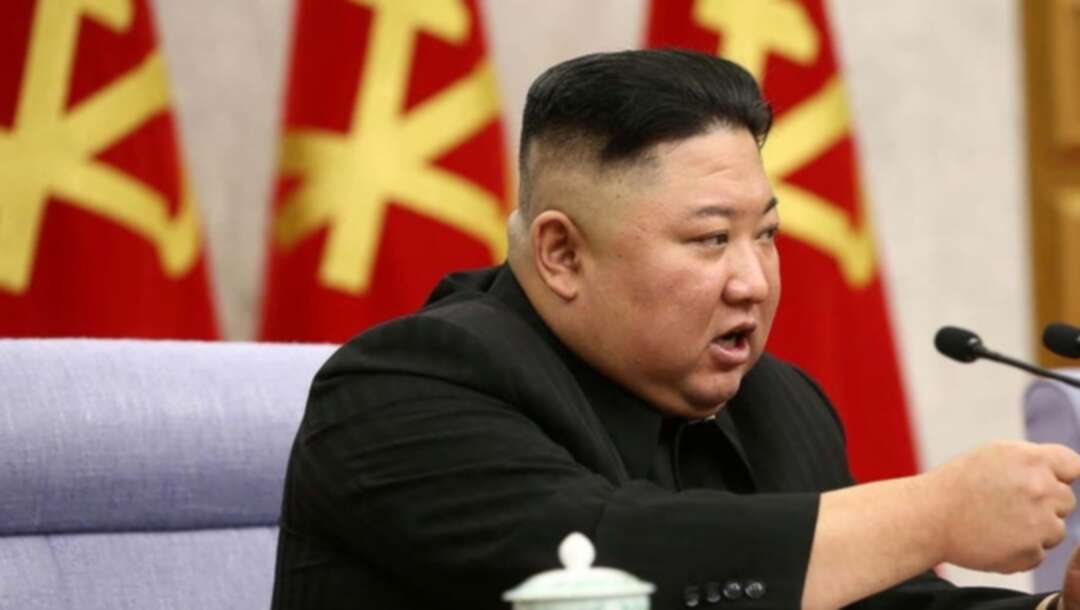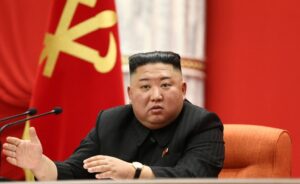-
N. Korea’s Kim blames officials for country’s economic failures

North Korean leader Kim Jong Un has ripped into the performance of his Cabinet and fired a senior economic official he appointed a month ago, saying they’d failed to come up with new ideas to salvage an economy in decay.
The report by state media on Friday comes during the toughest period of Kim’s nine-year rule. The diplomacy he had hoped would lift US-led sanctions over his nuclear program is stalemated, and pandemic border closures and crop-killing natural disasters last year deepened the damage to an economy broken by decades of policy failures, including a crippling famine in the 1990s.
The border closure caused trade volume with China, the main source of support for North Korea’s economy, to drop by 75 percent in the first 10 months of the year. Raw materials shortages caused factory output to plunge to its lowest level since Kim took power in 2011, and prices of imported foods like sugar quadrupled, according to South Korea’s spy agency.
Some analysts say the current challenges may set up conditions for an economic perfect storm in the North that destabilizes markets and triggers public panic and unrest.
 This picture taken on January 10, 2021 released from North Korea's official Korean Central News Agency (KCNA) on January 11, 2021 shows North Korean leader Kim Jong Un. (AFP)
This picture taken on January 10, 2021 released from North Korea's official Korean Central News Agency (KCNA) on January 11, 2021 shows North Korean leader Kim Jong Un. (AFP)The current challenges have forced Kim to publicly admit that past economic plans hadn’t succeeded. A new five-year plan to develop the economy was issued during the ruling Workers’ Party congress in January, but Kim’s comments during the party’s Central Committee meeting that ended Thursday were rich with frustration over how the plans have been executed so far.
During Thursday’s session, Kim lamented that the Cabinet was failing in its role as the key institution managing the economy, saying it was producing unworkable plans while displaying no “innovative viewpoint and clear tactics.”
He said the Cabinet’s targets for agricultural production this year were set unrealistically high, considering limited supplies of farming materials and other unfavorable conditions. Targets for electricity production were set too low, he said, showing a lack of urgency when shortages could stall work at coal mines and other industries.
“The Cabinet failed to play a leading role in mapping out plans of key economic fields and almost mechanically brought together the numbers drafted by the ministries,” the KCNA paraphrased Kim as saying.
The KCNA also said that O Su Yong was named as the new director of the Central Committee’s Department of Economic Affairs during this week’s meeting, replacing Kim Tu Il who was appointed in January.
During the party congress, Kim Jong Un called for reasserting greater state control over the economy, boosting harvests and prioritizing the development of chemicals and metal industries. He also vowed all-out efforts to bolster his nuclear weapons program in comments that were seen as an attempt to pressure the new Biden administration.
 North Korean leader Kim Jong Un guides the 14th enlarged meeting of Political Bureau of 7th Central Committee of WPK in this undated photo released on July 2, 2020 by North Korean Central News Agency (KCNA) in Pyongyang. (KCNA via Reuters)
North Korean leader Kim Jong Un guides the 14th enlarged meeting of Political Bureau of 7th Central Committee of WPK in this undated photo released on July 2, 2020 by North Korean Central News Agency (KCNA) in Pyongyang. (KCNA via Reuters)To truly revive the economy, analysts say, the country needs to invest heavily in modern factory equipment and technology, and to either import more food or improve farm productivity: a UN assessment in 2019 found that 10.1 million people, or 40 percent of the population, were food insecure and in urgent need of assistance. The border closure has hindered updates on the situation, but output of staple grains had plateaued since surging a few years ago, when farmers were allowed to retain more of their harvests instead of handing them entirely over to the government.
The UN Food and Agricultural Organization estimates that nearly half of North Koreans are undernourished.
The metal and chemical industries are crucial for revitalizing stalling manufacturing, which has been decimated by UN sanctions and disrupted imports of factory materials amid the pandemic. However, most experts agree that North Korea’s new development plans aren’t meaningfully different from its previous ones that lacked in substance.
South Korean intelligence officials say there are also signs that the North is taking dramatic steps to strengthen government control over markets, including suppressing the use of US dollars and other foreign currencies.
Such efforts might compel people to exchange their foreign currency savings for the North Korean won. They demonstrate the government’s sense of urgency over its depleting foreign currency reserves, analysts say.
source: The Associated Press
Image source: Reuters
Levant
You May Also Like
Popular Posts
Caricature
BENEFIT Sponsors BuildHer...
- April 23, 2025
BENEFIT, the Kingdom’s innovator and leading company in Fintech and electronic financial transactions service, has sponsored the BuildHer CityHack 2025 Hackathon, a two-day event spearheaded by the College of Engineering and Technology at the Royal University for Women (RUW).
Aimed at secondary school students, the event brought together a distinguished group of academic professionals and technology experts to mentor and inspire young participants.
More than 100 high school students from across the Kingdom of Bahrain took part in the hackathon, which featured an intensive programme of training workshops and hands-on sessions. These activities were tailored to enhance participants’ critical thinking, collaborative problem-solving, and team-building capabilities, while also encouraging the development of practical and sustainable solutions to contemporary challenges using modern technological tools.
BENEFIT’s Chief Executive Mr. Abdulwahed AlJanahi, commented: “Our support for this educational hackathon reflects our long-term strategic vision to nurture the talents of emerging national youth and empower the next generation of accomplished female leaders in technology. By fostering creativity and innovation, we aim to contribute meaningfully to Bahrain’s comprehensive development goals and align with the aspirations outlined in the Kingdom’s Vision 2030—an ambition in which BENEFIT plays a central role.”
Professor Riyadh Yousif Hamzah, President of the Royal University for Women, commented: “This initiative reflects our commitment to advancing women in STEM fields. We're cultivating a generation of creative, solution-driven female leaders who will drive national development. Our partnership with BENEFIT exemplifies the powerful synergy between academia and private sector in supporting educational innovation.”
Hanan Abdulla Hasan, Senior Manager, PR & Communication at BENEFIT, said: “We are honoured to collaborate with RUW in supporting this remarkable technology-focused event. It highlights our commitment to social responsibility, and our ongoing efforts to enhance the digital and innovation capabilities of young Bahraini women and foster their ability to harness technological tools in the service of a smarter, more sustainable future.”
For his part, Dr. Humam ElAgha, Acting Dean of the College of Engineering and Technology at the University, said: “BuildHer CityHack 2025 embodies our hands-on approach to education. By tackling real-world problems through creative thinking and sustainable solutions, we're preparing women to thrive in the knowledge economy – a cornerstone of the University's vision.”
opinion
Report
ads
Newsletter
Subscribe to our mailing list to get the new updates!






















